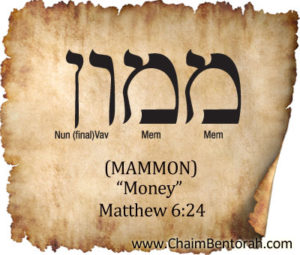HEBREW WORD STUDY – MONEY – MAMMON – ממון Mem Mem Vav Nun
Matthew 6:24: “No man can serve two masters: for either he will hate the one, and love the other; or else he will hold to the one, and despise the other. Ye cannot serve God and mammon.”
 “Money a curse? Might I be afflicted and never recover.” Tevye – Fiddler On The Roof.
“Money a curse? Might I be afflicted and never recover.” Tevye – Fiddler On The Roof.
This is a very curious verse. Jesus is saying that no man can serve two masters and then he speaks specifically to mammon which we all know means money. What is curious is that God has blessed the Jewish people with the ability to earn money and lots of it. Why should Jesus condemn having money? Even more curious is why He used the word mammon. Mammon is simply a transliteration from the Hebrew. Here Jesus is speaking Aramaic or Greek if you follow that school of thought and then he throws in a Hebrew word. Why did he not use the Greek word for money nomisma or even the Aramaic word mamonas but instead he uses the Hebrew word mammon and it is not even Biblical Hebrew, it is Classical Hebrew. You will not find mammon in the Old Testament.
Clearly, in the context, Jesus is talking about laying up treasures here on earth. Jews have always followed a sacred rule about riches and that is that if God does prosper you it is only so you can help others in need. Christians focus on the story of the rich man and Lazarus as a story about hell. Yet, when you read this story it appears the rich man went to hell because he was rich and Lazarus went to heaven because he was poor. But consider this story from a Jewish perspective. What the disciples were hearing was that this rich man did not share his wealth. He had an opportunity to use the wealth God gave him for the benefit of others by taking care of Lazarus, but he did not, he only thought of himself. Then after death, he calls out to Lazarus whom he shunned on earth for a drop of water. Why a drop of water and not a glass of water or a jug of water? Because he knew that on earth a drop of water is probably all he gave the Lazarus if even that. Then he begs that his brothers be warned. Now he is thinking of someone other than himself. But it would do no good for they would not even listen to the prophets who taught all these things about wealth, giving and sharing. You see, they were trying to serve two masters God and mammon but you can’t serve both. You either serve the pleasures of earth metaphorically expressed as money or you served the spiritual, the God of heaven.
The concept of being unable to serve two masters is very much ingrained in the Jewish psyche. Even the Rothschilds used their wealth to purchase land in Israel and agricultural equipment. They were the richest family in the world in the 19th century and they gave tons of mammon for Israel and other causes. God entrusts the Jews with wealth because he knows they understand how mammon can become your master and they tread cautiously, not always successfully, but they do have a community that reminds them that their wealth can become their master. Remember Tevye’s song: If I Were a Rich Man. He lists everything he would do with his wealth and all is for his wife and family, for him, it would give him the “Time that I lack to sit in the synagogue and pray.” That is the Jewish concept of wealth, to care for your family and others and to free you up to study Torah and pray.
Which begs the question, if Jesus was reminding the Jewish people of their understanding of this not serving two masters business, why did he use the Classical Hebrew word for money, mammon instead of the Aramaic word mammonas or Greek word nomisma? Because Jesus, like a good rabbi, was making a little wordplay, that you could not do with the Greek or the Aramaic. Well, you might do it with the Aramaic, but switching to Hebrew for this one word would alert the disciples to his little wordplay or shall we say humorous joke?
Think for a moment. What other Hebrew word does mammon sound like? I see I have a smart readership. You are right it sounds like manna. Now when Jesus comes to the end of His homily he, without warning, throws out a Hebrew word. A word not used in the Biblical Hebrew so the disciples might not have picked up on it right away: “Huh? What did He say?” Asked Peter. “Did you get that word?” asked Simon. “He said manna.” Replied James. “No, it sounded like manna.” Said Bartholomew. Then John, the more educated one who probably knew Classical Hebrew would have said: “No he said mammon which means money.” “What is it?” asked Thomas. John would have answered; “That is exactly Jesus’s point. What is money anyway, it is just an earthly treasure like our Master has just finished teachings us.”
By the way, if you did not follow this the word mammon was a play off the word manna which sounds like mammon. Jesus was making a pun. The Hebrew Bible is filled with puns. So mammon means money and manna means – what is it?







The Love of Money is the problem, Not the Money itself. King Solomon said in proverbs ” Money answers all things ”
I had made a lot and lost a lot, Which has put me in the position of only trust God. Money can fly away like a bird :)
Love the teaching…..